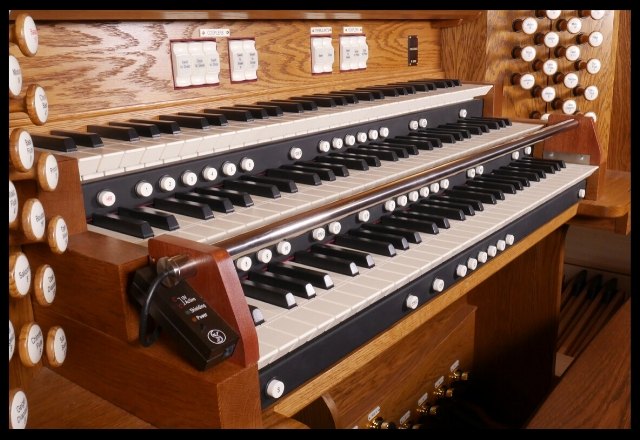The COVID-19 Pandemic has had a huge impact on the lives of musicians. Their opportunities to play instruments dropped significantly with the closure of churches and schools, but also in all paid-playing opportunities for events being stopped almost overnight
What we had to consider
With the lockdown, and then the announcement of stage easing of the economy, I had to have a good think about how, on earth, we were going to open our showroom in Bicester to visitors again.
I didn’t have too much of an issue opening the showroom, but it was more the matter of opening and giving visitors the comfort of knowing that we had COVID-secure practices in place for them to do so safely.
My investigation began in April 2020
As well as wondering how we would manage safely opening our showroom for customers, I also noticed a significant debate arising on social media concerning keyboard cleaning and sterilising techniques. The combination of these two triggers has resulted in the KeySAN device I am introducing to you today!
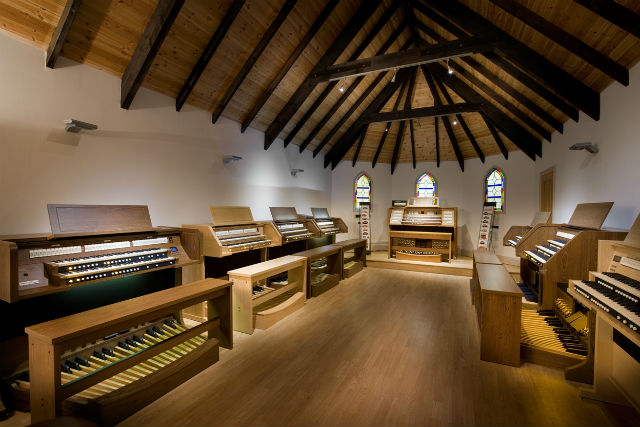
I took the time to properly investigate what institutions were using. The kind where multiple players were using single instruments, and there was a need to find a way of cleaning instruments that was quick, efficient and effective in irradiating viruses like COVID-19. One examining board was contemplating individual pianos for all candidates attending on the day.
It was clear that hands are one of the most prominent vectors of the pathogen and with a keyboard used by several different organists – this could become a place for the virus to spread. I was not enthused at the idea of using any liquid disinfectants due to the difficulty of ensuring all areas of the keyboards were properly covered. (Also we spend our entire playing life trying to ensure that keys do not get wet or that liquids get between keys and effect the delicate keyboard mechanisms – so this was not an option!)
It was becoming obvious to me that leaving this cleaning task to a human opens the possibility of accidental omission of areas such as the sides of the sharp notes. How could we automate this process?
I looked outside the music industry
My research took me into other industries like opticians, operating theatres and even, the food industry where UV-C light is successfully used as a sterilising mechanism.
UV-C, at the right dosage, breaks down the cellular walls of bacteria and viruses and kills them, in 99.9% of the cases. So, I immediately decide to work out how we could use this cleansing light to build a solution to use in our showroom.
I rigged up a crude prototype unit using proprietary UV wands available for the showroom and tested my theory. While I was doing this, it became apparent that it wouldn’t just be us that would need this kind of device for multiple players – churches and schools would too.
I turned to our console builder at Renatus to help
I took my crude drawings and prototype to Colin Peacock, our master craftsman who builds our beautiful bespoke organ consoles for Regent Classic Organs, and asked for his help in developing the concept.
Colin took the idea and designed and produced a unit which is now known as the KeySAN device. With his usual extraordinary quality of joinery that has made Renatus what it is today, as well as his excellent electrical design and manufacture skills – he also created the fail-safe features which were need for the KeySAN device.
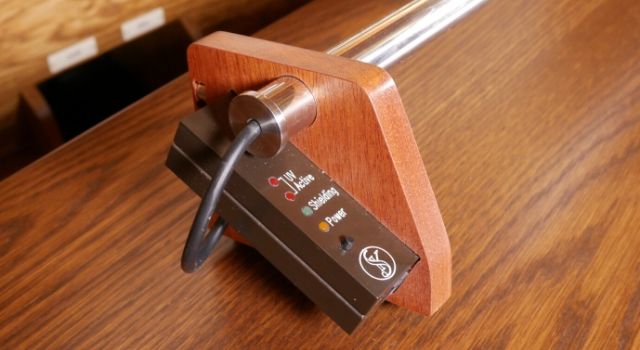
How it works
The principal is simple. UV-C light from a low voltage LED source is accurately shone on the keyboard surface for a measured time span, sufficient to kill 99.99% of COVID-19 that might have found its way there.
I explain more in this video:
Staying safe while using the device
The main challenge we faced was making the device simple and safe to use, as it uses a hazardous dose of UV-C light. This is the same technology which is used in tanning salons where a technician will ensure the client wears goggles and does not get too high a dose on their skin. Our customers will be using the device themselves, so we had to build in some basic safeguards.
We have created a device so that once it is set-up on the key cheeks, the light from the LEDs only falls on the keyboard area. A soft light proof cloth blanket is then placed over the full area being cleaned and over the device – to prevent any light from escaping. Small magnets hold the cloth in place.
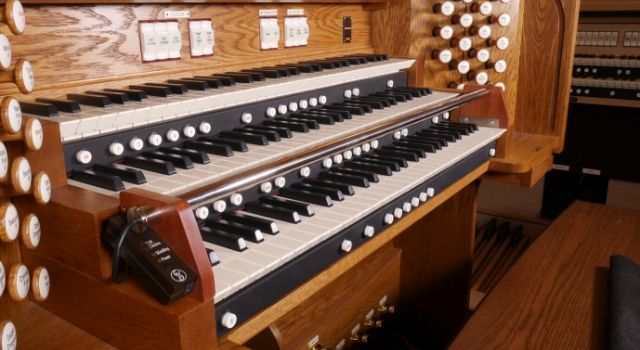
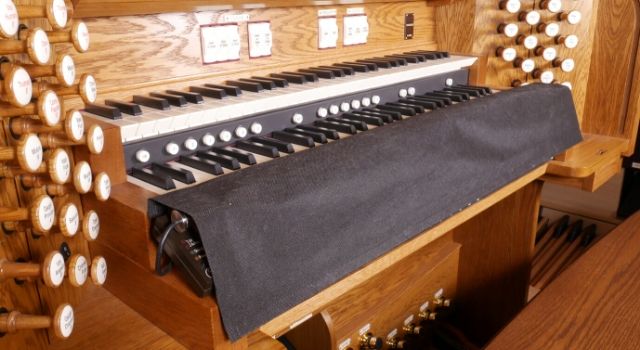
A light sensor prevents the device switching on if the blanket is not in place. There is a timer on the device which ensures that it switches off once the pre-set dose has been delivered. We also supply a pair of safety glasses (effective for protecting eyes from the UV-C light) which can be used while the device is active.
Organs and piano keyboards
We have designed two different sized devices, one for organs and one for pianos. The organ device can be used for keyboards from 56 notes and upwards, and the piano device is designed for a standard 88 note compass at 167 mm Octave span but will adjust laterally to take up any difference in the ‘octave span’ to which older instruments may have been built. (A version is also available for extended compass instruments of up to 97 notes.)
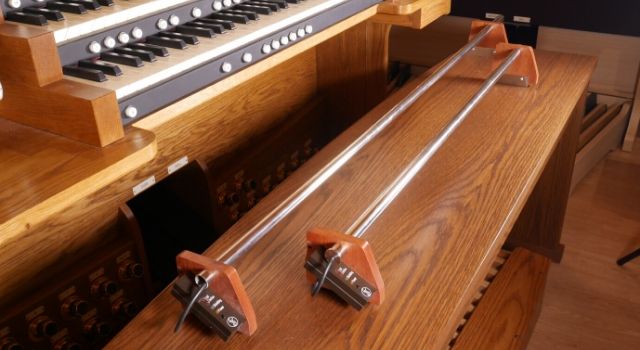
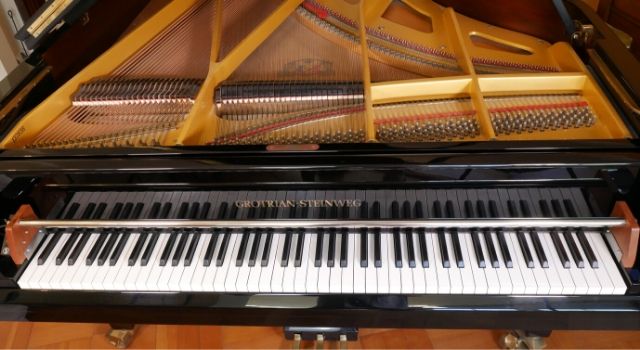
More information and registering interest
As you can imagine, we have received quite a bit of interest in these KeySAN devices, so we are all set to manufacture at volume. We have launched the KeySAN website to provide some information and a route for people to register interest in buying the device. The price starts at £599 (includes shipping).
If you want to reserve a device for your church or school, then please do complete our ‘Registration of Interest’ form on the Contact Page on the KeySAN website.
The website does not have the facility to purchase the device right now. We will release this facility as soon as we have stock of the device. If you register your interest, you will be added to a waiting list and we will be updating you as soon as we can launch the device to market. Until then you can contact the KeySAN team on:
Email: info@uvkeysan.com or by phone on 01869 329520. We have also created a Facebook Page, so you can also follow that for updates and more information if you wish.
We hope you will be just as excited about this device as we are, and we hope it will help music teachers and organists alike in getting back to playing in venues again.
_____
Further resources regarding research and technical evidence of UV-C dosage being used to irradiate COVID-19:
I have had a passion for church organs since the tender age of 12. I own and run Viscount Organs with a close attention to the detail that musicians appreciate; and a clear understanding of the benefits of digital technology and keeping to the traditional and emotional elements of organ playing.
